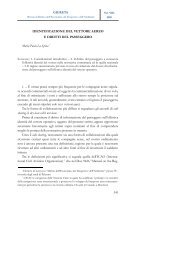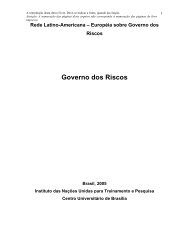The Old and the New Limits to Freedom of Contract in Europe
The Old and the New Limits to Freedom of Contract in Europe
The Old and the New Limits to Freedom of Contract in Europe
Create successful ePaper yourself
Turn your PDF publications into a flip-book with our unique Google optimized e-Paper software.
ERCL 2/2006 <strong>The</strong> <strong>Old</strong> <strong>and</strong> <strong>the</strong> <strong>New</strong> <strong>Limits</strong> <strong>to</strong> <strong>Freedom</strong> <strong>of</strong> <strong>Contract</strong> <strong>in</strong> <strong>Europe</strong><br />
273<br />
Is this our future? We can imag<strong>in</strong>e a <strong>Europe</strong>an scenario where freedom <strong>of</strong><br />
contract – <strong>in</strong> l<strong>in</strong>e with a very th<strong>in</strong> version <strong>of</strong> <strong>the</strong> paternalistic model – will be<br />
widely conceived <strong>and</strong> enforced <strong>in</strong> reference <strong>to</strong> trade, labour, B2B <strong>and</strong> (most)<br />
B2C transactions, <strong>and</strong> by contrast <strong>in</strong>tensely restricted – accord<strong>in</strong>g <strong>to</strong> <strong>the</strong><br />
perfectionist model – <strong>in</strong> relation <strong>to</strong> people’s existential choices, <strong>in</strong>volv<strong>in</strong>g<br />
sexuality, <strong>the</strong> body, family relations <strong>and</strong> <strong>the</strong> like. This trend will probably<br />
couple a parallel strategy <strong>in</strong> <strong>the</strong> harmonisation process, with <strong>the</strong> vic<strong>to</strong>ry <strong>of</strong><br />
<strong>the</strong> maximum st<strong>and</strong>ard mode as <strong>to</strong> <strong>the</strong> former area <strong>and</strong> <strong>the</strong> success <strong>of</strong> <strong>the</strong><br />
m<strong>in</strong>imum common fac<strong>to</strong>r approach as <strong>to</strong> <strong>the</strong> latter. In my own view this is a<br />
quite frighten<strong>in</strong>g perspective.<br />
So far <strong>the</strong> ECJ has not directly enforced <strong>the</strong> human dignity clause as a fundamental<br />
pr<strong>in</strong>ciple <strong>of</strong> <strong>the</strong> EU Charter. However <strong>in</strong> <strong>the</strong> Omega case it balanced<br />
(<strong>and</strong> actually restricted) <strong>the</strong> Treaty free movement <strong>of</strong> goods <strong>and</strong> services with<br />
a fundamental pr<strong>in</strong>ciple <strong>of</strong> a Member State legal order, namely with <strong>the</strong> respect<br />
<strong>of</strong> human dignity endorsed by <strong>the</strong> German Basic Law. 43<br />
Now, <strong>the</strong>re are good ‘technical’ motives <strong>to</strong> resist <strong>the</strong> triumph <strong>of</strong> <strong>to</strong>day’s prevail<strong>in</strong>g<br />
conception <strong>of</strong> human dignity on <strong>the</strong> <strong>Europe</strong>an scene. As a limit <strong>to</strong><br />
freedom <strong>of</strong> contract, dignity is a <strong>to</strong>o <strong>in</strong>def<strong>in</strong>ite <strong>and</strong> uncerta<strong>in</strong> notion, for two<br />
different reasons. First, unlike <strong>the</strong> way courts normally <strong>in</strong>terpret st<strong>and</strong>ards<br />
like bonus mores <strong>and</strong> public policy that are his<strong>to</strong>rically determ<strong>in</strong>ed <strong>and</strong> relative,<br />
<strong>and</strong> <strong>the</strong>refore likely <strong>to</strong> work as an objective limit <strong>to</strong> judiciary discretion,<br />
<strong>the</strong> human dignity doctr<strong>in</strong>e presents dignity as a transcendent, pre-legal value,<br />
which is not <strong>in</strong>fluenced or def<strong>in</strong>ed by his<strong>to</strong>rical or social circumstances. As<br />
such it is completely detached from objective st<strong>and</strong>ards, so that <strong>the</strong> court is<br />
<strong>the</strong> only <strong>and</strong> absolute judge <strong>of</strong> it.<br />
Second, <strong>in</strong> <strong>the</strong> most significant case law <strong>the</strong> case could have been decided <strong>in</strong><br />
two opposite ways, both based on dignity protection. In fact, courts prohibit<br />
an activity alleged as violat<strong>in</strong>g human dignity while <strong>the</strong> same activity is<br />
assumed by <strong>the</strong> person whose dignity is concerned as enhanc<strong>in</strong>g her/his social<br />
dignity. Social dignity has not disappeared from <strong>the</strong> word<strong>in</strong>g <strong>of</strong> national<br />
courts. In ano<strong>the</strong>r French dignity case <strong>the</strong> Conseil constitutionnel explicitly<br />
refers <strong>to</strong> human dignity <strong>in</strong> relation <strong>to</strong> <strong>the</strong> right <strong>to</strong> a decent home for everybody<br />
as precondition <strong>to</strong> a normal family life. 44 Similarly <strong>the</strong> Italian Constitutional<br />
Court affirmed <strong>the</strong> nature <strong>of</strong> fundamental (social) right <strong>of</strong> <strong>the</strong> right <strong>to</strong><br />
hous<strong>in</strong>g as a necessary prerequisite for a dignified life. 45<br />
43 Case 36/02 Omega v Oberbürgermeister<strong>in</strong> der Bundesstadt Bonn [2004].<br />
44 Cons const, 19 May 1995, 94-359 DC.<br />
45 Corte cost, 7 April 1988, n 404.



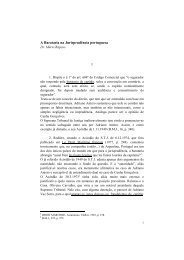


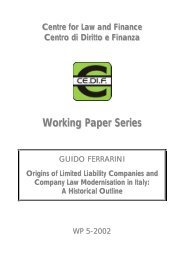
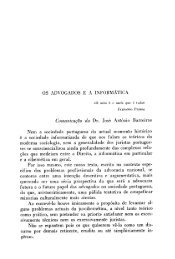
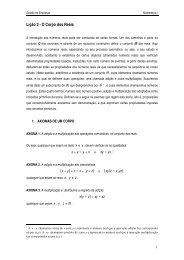

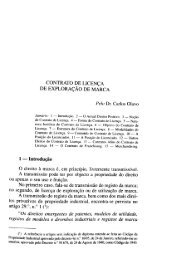
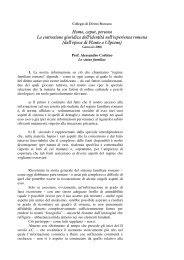
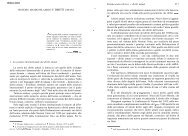

![Luigi Sapio Nozione di islām La parola “islām” [ ] è il mas.dar1 ...](https://img.yumpu.com/15836073/1/185x260/luigi-sapio-nozione-di-islam-la-parola-islam-e-il-masdar1-.jpg?quality=85)
